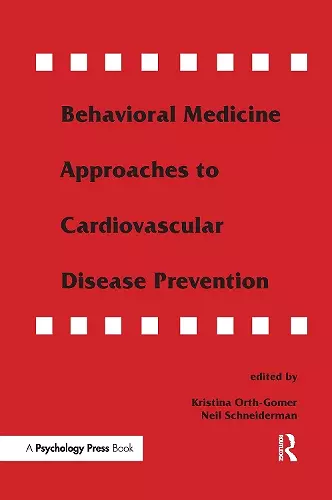Behavioral Medicine Approaches to Cardiovascular Disease Prevention
Neil Schneiderman editor Kristina Orth-Gomer editor
Format:Paperback
Publisher:Taylor & Francis Ltd
Published:26th Aug '16
Currently unavailable, and unfortunately no date known when it will be back
This paperback is available in another edition too:
- Hardback£145.00(9780805818208)

Cardiovascular disease (CVD) is the number one killer of men and women in industrialized countries. In older age groups, CVD is also the most important cause for hospitalization, and, in many countries, it is the basis of early retirement from work. Thus, CVD is associated with enormous costs for care and loss of productivity, as well as for disabilities, pensions, etc. All this has motivated clinicians and scientists to develop and implement new methodologies and technologies to better care for patients who are hospitalized for heart disease.
Efforts to improve care in the acute phases of coronary heart disease (CHD) have been successful. During the last decade, the immediate mortality risk of a patient admitted to coronary care for a suspected myocardial infarction or other acute coronary syndrome has decreased to less than 10%. Despite these achievements, CVD continues to represent a major threat to the health of middle-aged and elderly men and women.
This volume addresses myriad aspects of CHD prevention, including biobehavioral and psychosocial factors, behavioral epidemiology, behavioral intervention models, and policy. The first section of the text provides an introduction to CVD prevention and behavioral medicine. The second section introduces two theoretically different approaches to preventive action, high-risk and population-based strategies. The third section describes and discusses the important questions of how behavioral sciences can be conceptually integrated into traditional, medically based, preventive efforts. The fourth section presents both population and high-risk behavioral intervention approaches.
In summary, this volume examines the social environment and its potentials for preventive actions, reviews the psychosocial and biobehavioral mechanisms involved in these effects, and describes concrete and practical implementations of behavioral medicine knowledge as they have been applied to CHD prevention.
"This is a highly recommended book for those who are interested in behavior and cardiovascular disease. It provides the kind of concrete examples needed to stimulate work in the area of disease prevention while providing a framework that firmly ties prevention to our knowledge of behavioral risk factors in cardiovascular disease."
—Contemporary Psychology
"Overall, the volume is a credit to the editors and the various authors. They all show their expertise in many ways --sometimes just the excellent selection of a few things to comment on, somtimes a very personal style. There is really something for nearly everybody starting from the novice to the level of an expert, from the social scientist to the physiologist. Reading it is fun and challenging, too.
—Journal of Health Psychology
ISBN: 9781138964518
Dimensions: unknown
Weight: 453g
336 pages